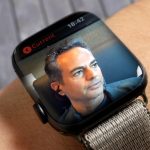Overview
Founded in 2006 by internationally-recognized physician visionary Dr. Leslie Saxon, the USC Center for Body Computing (CBC) is a thought leader innovation hub designed to bring together digital and life sciences executives, sensor and mobile app investors, strategists, designers, investors and thought leaders from healthcare, entertainment and technology to collaborate on transformative care solutions. In collaboration with IMSC and the Keck Medicine of USC, the CBC conducts clinical trials and human performance studies. These studies help define and guide member’s product development efforts; validate efficacy of sensor and app design; and support patient empowered health using digital tools. The future patient care models, including the Virtual Care Clinic, being developed at the CBC will leverage technology along with physician expertise to bring disease treatment and management options to more people on demand at an affordable cost.
Selected Publications and Results
Published research from the USC CBC and partners:
o AliveCor and Kardia Mobile: The CBC and AliveCor have grown a partnership the last few years through validation studies of the AliveCor electrocardiogram (ECG) sensor that doubles as a phone case, called Kardia Mobile. The CBC conducted research with over 1,100 non-medical users showing the potential for the public to use accurate medical grade digital sensors for health and recreation regardless of age or profession and to discover new and interesting use-cases for remote heart monitoring. This research, “Ubiquitous wireless ECG recording: a powerful tool physicians should embrace,” was published in the Journal of Cardiovascular Electrophysiology. This was followed by a second research project involving a 2,000 patient usability and behavioral study that captured 30-second ECG and heart rate data as well as user feedback regarding app engagement to further understand how on-demand diagnostic tools can improve health literacy over a six month period with mobile technology. “Wireless Smart Phone Equipped ECG Enables Large Scale Screening in Diverse Populations” was also published in the Journal of Cardiovascular Electrophysiology.
o VSP Global: THE SHOP, VSP Global’s innovation lab, formed a major collaboration with the CBC in 2015. The partnership focuses on mobile health, wearable technology and the growing intersection of personalized, empowered healthcare for VSP’s 77 million members. The first phase of the partnership was in support of THE SHOP’s Level™, one of the first wearables to seamlessly integrate health-tracking technology into the temple of an optical frame. The first generation of the device synchs via Bluetooth to a custom app, tracking the wearer’s steps, calories burned, activity time and distance traveled. The CBC and VSP published its first in a series of user/wearer research articles in the New England Journal of Medicine Catalyst (NEJM Catalyst). The research was the first to explore motivational factors and showed digital coaching, social networks, charitable giving and life satisfaction all help maintain or raise activity levels up to 25 percent.
o Proteus Digital Health: In collaboration with Proteus Digital Health, the CBC is studying an ingestible sensor solution that can be implanted into medications for a population of USC heart failure patients. These sensors are networked and can communicate with data clouds, allowing for easy monitoring of medication adherence by physicians and patient family members to assist in treatment. Patients are also able to access and manage their medications, steps, activity, rest, heart rate, blood pressure and weight through the Proteus mobile app. The study will analyze the ability of the Proteus platform to be utilized as a chronic disease management tool for patients needing to adhere to multiple medications. Patients in the study will be taking two to three heart failure management medications and we will validate sensor transmission as well as the applicability of the platform for hospital to home transition care.
o Medable: The CBC in collaboration with Medable is developing a mobile application for patients with ventricular assist devices (VAD) due to end-stage heart failure. The app, called Vadable, prompts patients to collect daily VAD numbers and send an image of their driveline site in order to see if they are showing signs of infection. The supporting healthcare institution’s care team can join together through the app to communicate asynchronously on how to best provide care to all patients in need.
o AARP, UnitedHealthcare and Lyft: The CBC launched a pilot program study in fall 2017 designed to reduce social isolation and missed healthcare appointments among a group of approximately 100 Los Angeles seniors. Qualifying participants will be offered cost-free rides – to medical and non-medical destinations – for three months via Lyft. They will also use a wrist-worn activity tracker daily and keep a written daily log of activity during the study. USC researchers will track, measure and analyze the program’s impact on health, overall satisfaction and well-being, compliance with follow-up medical appointments, mobility and participation in social activities. The pilot will study the effectiveness of on-demand rides as a tool to reduce isolation among older adults and improve their health care utilization by eliminating the barrier of lack of transportation. It will also leverage the resulting data, outcomes, lessons learned and partnerships to better understand the impact of transportation support on social isolation among older adults, health outcomes and health care utilization.
Thought Leadership in Patient Health Information Security and Safety
In addition to research, the USC CBC also serves as a thought leader on regulatory and security issues that impact the integration of digital health into the health care system. To that end, the CBC works with local, regional and national organization on a variety of task force and other workgroups to achieve seamless adoption of digital health tools into the world of health.
The most recent collaboration in these efforts is with California Governor Jerry Brown’s Office of Business and Economic Development (GO-Biz). The CBC announced the formation of a new Cyber-Health Information Technology Advisory Board as part of an ongoing effort by GO-Biz to support cybersecurity innovation and bolster advanced technology industries. The advisory board will be led by the University of Southern California (USC) Center for Body Computing executive director, Leslie Saxon, and includes representatives from industry and education cybersecurity experts.

Leslie Saxon, MD
Professor of clinical medicine (clinical scholar) at the Keck School of Medicine of USC
USC Center for Body Computing
CBC is a leader innovation hub designed to bring together digital and life sciences executives.



